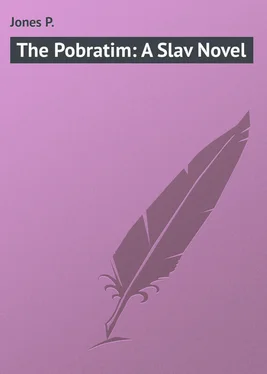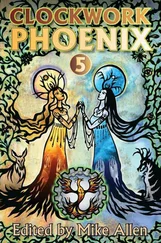P. Jones - The Pobratim - A Slav Novel
Здесь есть возможность читать онлайн «P. Jones - The Pobratim - A Slav Novel» — ознакомительный отрывок электронной книги совершенно бесплатно, а после прочтения отрывка купить полную версию. В некоторых случаях можно слушать аудио, скачать через торрент в формате fb2 и присутствует краткое содержание. Жанр: Прочие приключения, foreign_prose, на английском языке. Описание произведения, (предисловие) а так же отзывы посетителей доступны на портале библиотеки ЛибКат.
- Название:The Pobratim: A Slav Novel
- Автор:
- Жанр:
- Год:неизвестен
- ISBN:нет данных
- Рейтинг книги:3 / 5. Голосов: 1
-
Избранное:Добавить в избранное
- Отзывы:
-
Ваша оценка:
- 60
- 1
- 2
- 3
- 4
- 5
The Pobratim: A Slav Novel: краткое содержание, описание и аннотация
Предлагаем к чтению аннотацию, описание, краткое содержание или предисловие (зависит от того, что написал сам автор книги «The Pobratim: A Slav Novel»). Если вы не нашли необходимую информацию о книге — напишите в комментариях, мы постараемся отыскать её.
The Pobratim: A Slav Novel — читать онлайн ознакомительный отрывок
Ниже представлен текст книги, разбитый по страницам. Система сохранения места последней прочитанной страницы, позволяет с удобством читать онлайн бесплатно книгу «The Pobratim: A Slav Novel», без необходимости каждый раз заново искать на чём Вы остановились. Поставьте закладку, и сможете в любой момент перейти на страницу, на которой закончили чтение.
Интервал:
Закладка:
When the incident came to the ears of either parent – though they never knew exactly the rights of the whole affair, and they only thought that it was one of Radonic's mad freaks of jealousy – both Bellacic and Markovic thought it better to send their sons to sea as soon as possible.
"Having sown their wild oats," said Milos, "they can come back home and settle into the humdrum ways of married life."
"Besides," quoth Janko, "in big waters are big fish caught. The shipping trade is very prosperous just now; freights are high; so after some years of a seafaring life they may put aside a good round sum."
"Well," replied Milos, "the best thing would be to set them up in life; let us buy for them a share of some brig, and they, with their earnings, may in a few years buy up the whole ship and trade for themselves."
The vintage – very plentiful that year – was now over; the olive-trees, which had been well whipped on St. Paul's Day, had yielded an unexpected crop, so that the land, to use the Biblical pithy expression, was overflowing, if not with milk and honey, at least with wine and oil. The earth, having given forth its last fruits, was now resting from its labours, but the young men, though they had nothing more to do on shore, still lingered at Budua, no share of any decent vessel having been found for them.
At last the captain of a brigantine, a certain Giuliani, wishing to retire from business in some years, agreed to take them on a trial trip with him, and then, if he liked them and saw that they could manage the vessel by themselves, to sell them half of his ship afterwards.
All the terms of the contract having been settled, it was agreed that the two young men should sail in about a fortnight's time, when the cargo had all been taken on board.
Before starting, however, these youths, who loved each other tenderly, made up their minds to become kith-and-kin to each other – that is to say, brothers by adoption, or pobratim .
As St. Nicholas – the patron saint of the opposite town of Bari, on the Italian shores of the Adriatic – is one of the most revered saints of the Slavs and the protector of sailors, his feast, which was celebrated just a week before their departure, was chosen for the day of this august ceremony.
On the morning of that memorable day, the two young men, dressed, not in their simple sailor-like attire, but in the gorgeous and picturesque Buduan costume – one of the most manly and elegant dresses as yet devised by human fancy – with damaskened silver-gilt pistols and daggers to match, the hafts of which were all studded with round bits of coral, dark chalcedonies and blood-red carnelians. These had been the weapons of their great-grandfathers, and they showed by their costliness that they were no mean upstarts, dating only from yesterday, but of a good old stock of warriors.
Thus decked out, and not in borrowed plumes, they wended their way to the cathedral, where a special Mass was to be said for them. Each of them was accompanied by a kind of sponsor or best man, and followed by all their relations, as well as by a number of friends.
Having entered the crowded church – for such a ceremony is not often seen – Uros and Milenko went straight to the High Altar, and, bending down on one knee, they crossed themselves with much devotion. Then, taking off all their weapons, they laid them down on their right-hand side, and lighted their huge tapers. The best men, who stood immediately behind, and the relations, lit their wax candles, just as if it had been the ritualistic pomp of marriage; thereupon they all knelt down till the priest had finished chanting the liturgy, and, after offering up the Holy Sacrament, Mass came to an end. This part of the service being over, the priest came up to them, saying:
"Why and wherefore come ye here?"
"We wish to become brothers."
"And why do you wish to become brothers?"
"Out of love," quoth Uros, who was the elder of the two by a few months.
"But do you know, my children, what you really ask; have you considered that this bond is a life-long one, and that, formed here within the House of God, it can never be broken. Are you prepared to swear that, in whatever circumstance of life you may be placed, the friendship that binds you to-day will never be rent asunder?"
"We are."
"Can you take your oath to love and help each other as brothers should, the whole of your lifetime?"
"We can."
"Well, then, swear before God and man to love each other with real brotherly affection; swear never to be at variance, never to forsake each other."
The oath was solemnly taken. After this the priest administered them the Communion – though no more mixed up with a drop of their own blood; he gave them the pax to kiss, whilst the thurible-bearers were swinging their huge silver censers, which sent forth a cloudlet of fragrant smoke. The two friends were almost hid from the view of the gazing crowd, for, the pobratim being rich, neither frankincense nor myrrh had been spared. Then the priest, in his richest stole, placed both his hands above their heads, and uttered a lengthy prayer to God to bless them.
The ceremony having come to an end, the pobratim rose and kissed each other repeatedly. They were then embraced by their sponsors and relations, and congratulated by their friends. As they reached the church door, they were greeted by the shouts of " Zivio! " from all their friends, who, in sign of joy, fired off their pistols. They replied to their courtesy in the same fashion, and so the din that ensued was deafening.
Holding hands, they crossed the crowd, that parted to let them pass. Thus they both bent their steps towards Markovic's house, for, as he lived nearer the church than Bellacic did, he was the giver of the first feast in honour of the pobratim .
Upon entering the house, the young men kissed each other again; then forthwith Uros kissed Janko Markovic, calling him father, whilst Milenko greeted Uros' parents in the same way.
Afterwards presents were exchanged by the pobratim , then each member of either family had some gift in store for their newly-acquired kinsman, so that before the day was over they had quite a little store of pipes and gold-embroidered tobacco pouches.
Dinner being now ready, they all sat down to a copious, if not a very dainty meal; and the priest, who just before had asked a blessing upon the friends, was the most honoured of all the guests.
They ate heartily, and many toasts were drunk in honour of the two young men, and those that could made speeches in rhyme to them.
The feast was interrupted by the Kolo – a young man performing sundry evolutions with a decanter of wine upon his head, looking all the while as clumsy as Heine's famous bear, Atta Troll.
Then they began again to eat and drink, and filled themselves up in such a way that they could hardly move from the table any more, so that by the time St. Nicholas' Day came to an end, the hosts and almost all the guests were snoring in happy oblivion.
CHAPTER III
CHRISTMAS EVE
The fierce equinoctial blasts which that year had lasted for more than a month, were followed by a fortnight of fitful, heavy rain, intermitted by sudden gales and stormy showers. Then after a period of dull, drizzling, foggy weather, ending in a thick squall, the clouds cleared up beautifully, the sun showed itself again, and Spring apparently succeeded to Autumn.
The wind fell entirely. Not the slightest breeze was blowing to bring down the dry leaves, or to bicker the smooth surface of the waters. For days and days the sea remained as even as a mass of shining melted lead, with the only difference that it was as fathomably liquid and as diaphanously pure as the air itself, of which it even had the vaporous cerulean clearness. Far away on the offing, the waters blended with the watchet airiness of the surrounding atmosphere, so that the line of the horizon could nowhere be seen, the blueish-grey ocean melting into the greyish-blue of the sky. Nearer the shore, the smooth translucent sheet was streaked and spotted with those sheeny stripes and silvery patches, which Shelley terms a "coil of crystalline streams."
Читать дальшеИнтервал:
Закладка:
Похожие книги на «The Pobratim: A Slav Novel»
Представляем Вашему вниманию похожие книги на «The Pobratim: A Slav Novel» списком для выбора. Мы отобрали схожую по названию и смыслу литературу в надежде предоставить читателям больше вариантов отыскать новые, интересные, ещё непрочитанные произведения.
Обсуждение, отзывы о книге «The Pobratim: A Slav Novel» и просто собственные мнения читателей. Оставьте ваши комментарии, напишите, что Вы думаете о произведении, его смысле или главных героях. Укажите что конкретно понравилось, а что нет, и почему Вы так считаете.












